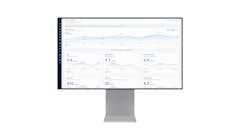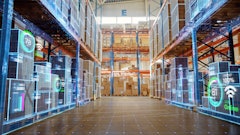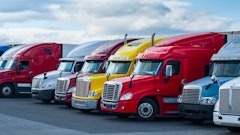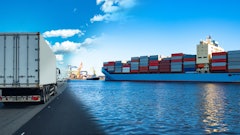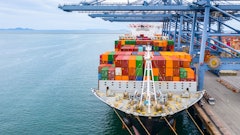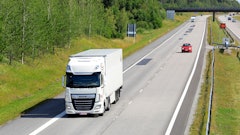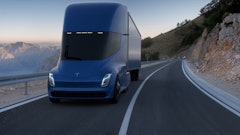
Many of today’s grocery and foodservice distributors utilize multi-temp reefers to meet their needs for versatility and high capacity. These specialized trailers can be divided into multiple temperature-controlled compartments, including ambient, in order to transport a variety of products in their required environment.
Recognizing their customers’ desire to achieve “green” or sustainability initiatives and to meet air quality regulations, multi-temp trailer manufacturers are investing in alternative technologies so their units can use less fuel and reduce emissions.
Features such as electric standby, durable trailer lining, LED lighting and CO2 refrigerant technology all help multi-temp trailer users reduce their carbon footprint and their gas bills.
“As consumers we see sustainability in all aspects of our culture, so naturally this is something the transportation industry is tuned in to,” explains Dave Kiefer, director of marketing and product management of Carrier Transicold, Athens, GA. “Our solution to this concern is developing ways to use less fuel, which lowers your carbon footprint and saves money, so it’s a win-win situation.”
But sustainability and air quality won’t be the only factors to drive multi-temp trends in 2011. Food safety regulations are on the radar for most grocery and foodservice transportation providers. Today’s manufacturers are coming up with new products and solutions to make sure the proper temperature is maintained for food safety.
Electric Standby
Electric standby operation is the latest trend to hit the reefer market. This feature allows the unit to plug into grid power and work like a large, sophisticated electric refrigerator. While the truck is stopped for loading, staging or cold storage, drivers now have the ability to turn off the diesel engine and power the refrigeration unit electrically, conserving fuel and eliminating exhaust emissions.
In addition to being an environmentally friendly operation model, it quickly shows an ROI in terms of operating costs because electricity is less expensive than diesel fuel.
“Using electric standby power has been popular in Europe for quite awhile now,” Kiefer says. “But in the past there hasn’t been enough incentive to do this in America. It requires infrastructure upgrades and if the price of diesel fuel is low, the payoff takes longer.”
Major spikes in fuel prices over the past few years, coupled with the passage of air quality regulations, such as those imposed by the California Air Resources Board (CARB), motivated companies in the United States to consider electric standby.
“In other parts of the world they’ve been doing this forever. In some places in Europe 70 percent of their trailers are equipped with electric standby because fuel has hit $11 or $12 a gallon in the past,” Kiefer says. “We developed this technology for outside the United States, and then decided to bring it into the United States in 2006 when we foresaw what was going to happen with fuel prices and regulations”
Carrier Transicold offers the Vector line, consisting of three products: A single-temp, a multi-temp and an engineless stationary model for cold-storage. With the refrigeration system’s all-electric architecture, Vector units deliver approximately the same performance on electric standby as they do in diesel operation.
Thermo King North America of Minneapolis, MN, offers an add-on electric standby feature called SmartPower for their conventional units.
“We’re seeing an increase in customers investing in the infrastructure to provide electric standby at their docks,” said Tom Kampf, trailer and rail product manager, Thermo King.
Thermo King offers a unique benefit to help their customers display their environmentally friendly decision to run electric standby.
“Some request to have the unit wrapped with a scene from nature to convey an environmental message,” says Kampf. “They can choose white sand beaches, fields of wheat and barley or mountain ranges. They want to visually show their customers and the community that they’re meeting their sustainability initiatives.”
City Of Industry, CA-based Utility Trailer builds over half of the refrigerated trailers in North America. As a California-based company, Utility’s senior vice president sales and marketing, Craig Bennett, is acutely aware of CARB’s rules and regulations.
“CARB accepts electric standby as a zero-pollution system as long as you carefully document the hours you’re running under electric power,” says Bennett. “While the trailer is at the dock being loaded, whether it’s one hour or 10 hours, CARB recognizes it as polluting no emissions whatsoever.”
That means no engine retrofits or add-on exhaust treatments, each of which generally has a starting price of $5,000.
Better Lining
Another way to reduce fuel usage is to ensure the multi-temp unit is well-insulated. Poorly insulated trailers have to work harder to maintain the temperatures required to keep foods safe and fresh.
Great Dane Trailer of Savannah, GA, has developed a unique liner specially made for reefer units called ThermoGuard. Chris Hammond, vice president of dealer sales, Great Dane, explains the problem with traditional liners. “Over time trailers lose their ability to insulate as the foam inside breaks down. Over a number of years it could lose 30 to 50 percent of its ability to insulate, and the effect is the refrigeration unit has to work harder to make up for the thermal loss, requiring more frequent oil changes because the engine runs more,”
“ThermoGuard has a barrier that prevents the foam from out-gassing, or breaking down quickly,” Hammond continues. “It allows the trailer to run longer and the logistics company to use less fuel over time and increase the intervals between PMs.”
LED Lighting
A continuing trend for 2011 will be the use of LED lights in the interior of the compartments in multi-temp trailers. Lighting has increasingly become more environmentally friendly over the years. Incandescent lights were once used, but they had many limitations, such as a short lifespan and a dim cast. Then fluorescents took their place as a more efficient option. They use less energy and last a bit longer, but LEDs lead the way when it comes to efficiency.
“The use of LED lighting is big,” says Hammond. “In a year or two fluorescent lights may not be offered. Our customers continually are asking for something that will last longer and keep bulbs out of the landfill, and that’s LED.”
CO2 Technology
Using CO2, a non-ozone-depleting refrigerant, instead of fuel or electricity to power refrigeration units is a relatively new trend that may gain popularity within the next five years, according to Thermo King’s Kampf. The EPA recently approved CO2 for use as a primary refrigerant in commercial refrigeration system applications for grocery facilities, so it may soon naturally progress to the transportation side.
GreenChill, an EPA partnership with food retailers to reduce refrigerant emissions, states that transcritical CO2 refrigeration is a type of refrigeration cycle in which CO2 is the sole refrigerant, evaporating in the subcritical region and rejecting heat at temperatures above the critical point in a gas cooler instead of a condenser.
“CO2 has been particularly popular in Europe and a handful of customers in the United States are testing it,” Kampf explains. “It’s reclaimed CO2, so we’re not producing any additional CO2. The ideal candidate for this model is someone who makes the same stops everyday and has a pre-determined trip schedule. Many multi-temp users fall into this category, so it may be an avenue to explore in the coming years.”
Food Safety Regulations
Great Dane’s Hammond predicts that food safety regulations will begin to impact multi-temp trailer designs and features.
“Five years ago there was no discussion on this, but today people want to know, from farm to table, that their product has been protected and handled safely,” says Hammond. “We’re starting to have customers ask us about food safety regulations and our trailers’ ability to keep their loads at the right temperature.”
Although government mandates on food safety have come slower than the industry expected, Thermo King’s Kampf says the industry is proactively self-regulating and many companies already offer tools to help their customers comply with mandates yet to come.
“Soon the government is going to get more involved in food safety, so more and more of our customers are taking steps to increase the tractability of product temperature by the use of telematics,” Kampf says. “They want to be able to monitor and change the temperature of the refrigeration unit whether it’s across town or across the country. Thermo King offers the Track King service, which uses satellite or cellular technology to track and change reefer temperatures remotely.”






